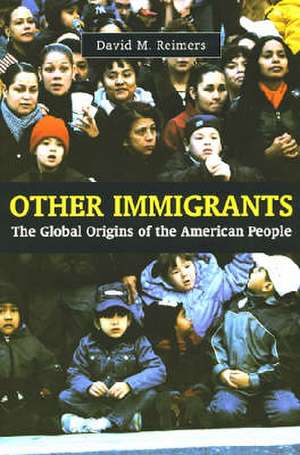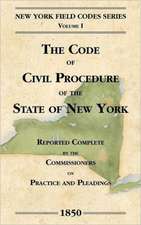Other Immigrants – The Global Origins of the American People
Autor David Reimersen Limba Engleză Paperback – 31 dec 2004
| Toate formatele și edițiile | Preț | Express |
|---|---|---|
| Paperback (1) | 247.01 lei 6-8 săpt. | |
| MI – New York University – 31 dec 2004 | 247.01 lei 6-8 săpt. | |
| Hardback (1) | 530.74 lei 6-8 săpt. | |
| Wiley – 31 dec 2004 | 530.74 lei 6-8 săpt. |
Preț: 247.01 lei
Nou
Puncte Express: 371
Preț estimativ în valută:
47.27€ • 48.98$ • 39.45£
47.27€ • 48.98$ • 39.45£
Carte tipărită la comandă
Livrare economică 21 martie-04 aprilie
Preluare comenzi: 021 569.72.76
Specificații
ISBN-13: 9780814775356
ISBN-10: 0814775357
Pagini: 390
Dimensiuni: 209 x 229 x 29 mm
Greutate: 0.54 kg
Editura: MI – New York University
ISBN-10: 0814775357
Pagini: 390
Dimensiuni: 209 x 229 x 29 mm
Greutate: 0.54 kg
Editura: MI – New York University
Recenzii
"The post-1965 immigration to the United States is larger and far more diverse than the 'New Immigration,' which had such profound an impact upon virtually every aspect of American life in the late nineteenth and early twentieth century. Reimers has written a comprehensive account of this new immigration, supplementing and in some respects transforming a story which a generation ago had been largely focused upon European immigration."
Institute of Historical Research "Reimers possesses a gift for weaving together chronological narrative and sociology."
The Journal of American History "The capstone of ground-breaking work on immigration, Reimer's thoughtful history recognizes the ambiguity and subjectivity of race, noting that individuals often define themselves more complexly than census forms allow."
NYU Today "While some social scientists write panicky articles about the 'changing face' of American immigration in the 21st century, historian David Reimers prefers the long view. His measured, nuanced history of black, Latino, and Asian immigration to the United States explains how, when, and why these groups came or were brought here. Shunning the Eurocentric perspective on migration to the United States, Reimers substitutes this rich chronicle that explains the contributions migrants of color made and continue to make to America's economy, society, and culture. Scholars must have it on their bookshelves; policy makers ought to, as well."
Alan M. Kraut, American University "I have always valued Reimers' books on immigration as a reference source as well as for my students who need access to well-written and comprehensive accounts of immigration history and politics. Other Immigrants continues in this succssful mold, providing a useful additional resource on the new immigration."
Mark Ellis, University of Washington, Seattle "In Other Immigrants David Reimers cements his position as a leading interpreter of recent and contemporary immigration. He uses his profound understanding of the process to weave the stories of individual newcomers into the epic of immigration to America showing that these latter day 'huddled masses,' largely from Latin America, the Caribbean, and Asia, have much in common with their predecessors."
Roger Daniels, author of Guarding the Golden Door: American Immigration Policy and Immigrants since 1882 "This work is recommended for anyone interested in the changing nature of the American population brought about by immigration since 1965."
Multicultural Review "Reimers's book has the merit of not leaving anyone out. Every nationality, religion, race, and ethnicity under the sun, or at least every group, community and set of beliefs which have become a presence in the great bouillabaisse of American life, gets a chapter, or a couple of pages, or a brief paragraph here."
Eric Homberger, University of East Anglia
"The post-1965 immigration to the United States is larger and far more diverse than the 'New Immigration,' which had such profound an impact upon virtually every aspect of American life in the late nineteenth and early twentieth century. Reimers has written a comprehensive account of this new immigration, supplementing and in some respects transforming a story which a generation ago had been largely focused upon European immigration." --Institute of Historical Research "Reimers possesses a gift for weaving together chronological narrative and sociology." --The Journal of American History "The capstone of ground-breaking work on immigration, Reimer's thoughtful history recognizes the ambiguity and subjectivity of race, noting that individuals often define themselves more complexly than census forms allow." --NYU Today "While some social scientists write panicky articles about the 'changing face' of American immigration in the 21st century, historian David Reimers prefers the long view. His measured, nuanced history of black, Latino, and Asian immigration to the United States explains how, when, and why these groups came or were brought here. Shunning the Eurocentric perspective on migration to the United States, Reimers substitutes this rich chronicle that explains the contributions migrants of color made and continue to make to America's economy, society, and culture. Scholars must have it on their bookshelves; policy makers ought to, as well." --Alan M. Kraut, American University "I have always valued Reimers' books on immigration as a reference source as well as for my students who need access to well-written and comprehensive accounts of immigration history and politics. Other Immigrants continues in this succssful mold, providing a useful additional resource on the new immigration." --Mark Ellis, University of Washington, Seattle "In Other Immigrants David Reimers cements his position as a leading interpreter of recent and contemporary immigration. He uses his profound understanding of the process to weave the stories of individual newcomers into the epic of immigration to America showing that these latter day 'huddled masses,' largely from Latin America, the Caribbean, and Asia, have much in common with their predecessors." --Roger Daniels, author of Guarding the Golden Door: American Immigration Policy and Immigrants since 1882 "This work is recommended for anyone interested in the changing nature of the American population brought about by immigration since 1965." --Multicultural Review "Reimers's book has the merit of not leaving anyone out. Every nationality, religion, race, and ethnicity under the sun, or at least every group, community and set of beliefs which have become a presence in the great bouillabaisse of American life, gets a chapter, or a couple of pages, or a brief paragraph here." --Eric Homberger, University of East Anglia
Institute of Historical Research "Reimers possesses a gift for weaving together chronological narrative and sociology."
The Journal of American History "The capstone of ground-breaking work on immigration, Reimer's thoughtful history recognizes the ambiguity and subjectivity of race, noting that individuals often define themselves more complexly than census forms allow."
NYU Today "While some social scientists write panicky articles about the 'changing face' of American immigration in the 21st century, historian David Reimers prefers the long view. His measured, nuanced history of black, Latino, and Asian immigration to the United States explains how, when, and why these groups came or were brought here. Shunning the Eurocentric perspective on migration to the United States, Reimers substitutes this rich chronicle that explains the contributions migrants of color made and continue to make to America's economy, society, and culture. Scholars must have it on their bookshelves; policy makers ought to, as well."
Alan M. Kraut, American University "I have always valued Reimers' books on immigration as a reference source as well as for my students who need access to well-written and comprehensive accounts of immigration history and politics. Other Immigrants continues in this succssful mold, providing a useful additional resource on the new immigration."
Mark Ellis, University of Washington, Seattle "In Other Immigrants David Reimers cements his position as a leading interpreter of recent and contemporary immigration. He uses his profound understanding of the process to weave the stories of individual newcomers into the epic of immigration to America showing that these latter day 'huddled masses,' largely from Latin America, the Caribbean, and Asia, have much in common with their predecessors."
Roger Daniels, author of Guarding the Golden Door: American Immigration Policy and Immigrants since 1882 "This work is recommended for anyone interested in the changing nature of the American population brought about by immigration since 1965."
Multicultural Review "Reimers's book has the merit of not leaving anyone out. Every nationality, religion, race, and ethnicity under the sun, or at least every group, community and set of beliefs which have become a presence in the great bouillabaisse of American life, gets a chapter, or a couple of pages, or a brief paragraph here."
Eric Homberger, University of East Anglia
"The post-1965 immigration to the United States is larger and far more diverse than the 'New Immigration,' which had such profound an impact upon virtually every aspect of American life in the late nineteenth and early twentieth century. Reimers has written a comprehensive account of this new immigration, supplementing and in some respects transforming a story which a generation ago had been largely focused upon European immigration." --Institute of Historical Research "Reimers possesses a gift for weaving together chronological narrative and sociology." --The Journal of American History "The capstone of ground-breaking work on immigration, Reimer's thoughtful history recognizes the ambiguity and subjectivity of race, noting that individuals often define themselves more complexly than census forms allow." --NYU Today "While some social scientists write panicky articles about the 'changing face' of American immigration in the 21st century, historian David Reimers prefers the long view. His measured, nuanced history of black, Latino, and Asian immigration to the United States explains how, when, and why these groups came or were brought here. Shunning the Eurocentric perspective on migration to the United States, Reimers substitutes this rich chronicle that explains the contributions migrants of color made and continue to make to America's economy, society, and culture. Scholars must have it on their bookshelves; policy makers ought to, as well." --Alan M. Kraut, American University "I have always valued Reimers' books on immigration as a reference source as well as for my students who need access to well-written and comprehensive accounts of immigration history and politics. Other Immigrants continues in this succssful mold, providing a useful additional resource on the new immigration." --Mark Ellis, University of Washington, Seattle "In Other Immigrants David Reimers cements his position as a leading interpreter of recent and contemporary immigration. He uses his profound understanding of the process to weave the stories of individual newcomers into the epic of immigration to America showing that these latter day 'huddled masses,' largely from Latin America, the Caribbean, and Asia, have much in common with their predecessors." --Roger Daniels, author of Guarding the Golden Door: American Immigration Policy and Immigrants since 1882 "This work is recommended for anyone interested in the changing nature of the American population brought about by immigration since 1965." --Multicultural Review "Reimers's book has the merit of not leaving anyone out. Every nationality, religion, race, and ethnicity under the sun, or at least every group, community and set of beliefs which have become a presence in the great bouillabaisse of American life, gets a chapter, or a couple of pages, or a brief paragraph here." --Eric Homberger, University of East Anglia
Notă biografică
David M. Reimers is emeritus professor of history at New York University. He is the author of Still in the Golden Door: The Third World Comes to America and The Immigrant Experience and co-author, with Leonard Dinnerstein and Roger Nichols, of Natives and Strangers: A Multicultural History of Americas.












